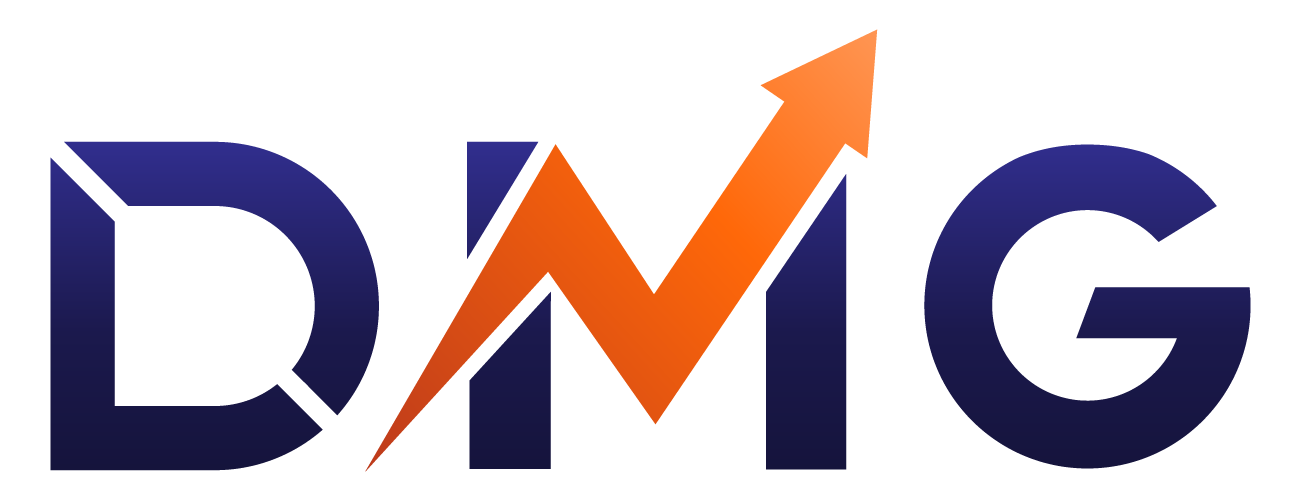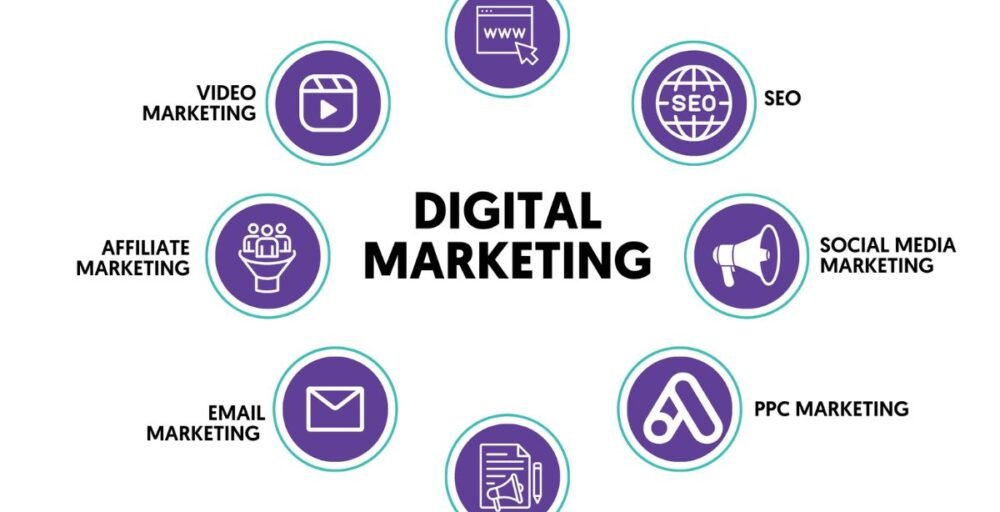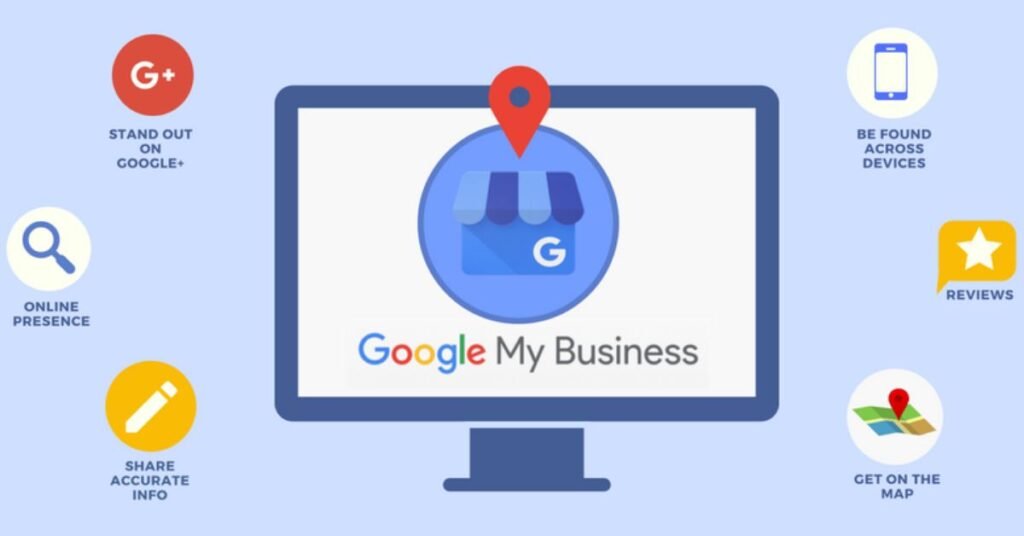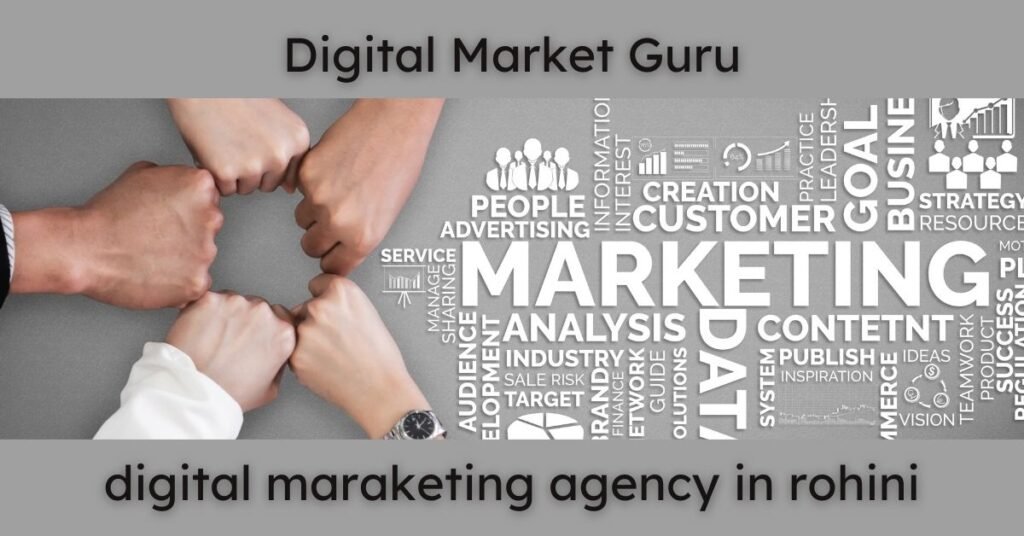- Introduction
1.1 Definition of Digital Marketing
Digital marketing refers to the use of digital channels, platforms, and technologies to promote products, services, and brands. Unlike traditional marketing, which often relies on physical media like print ads or direct mail, digital marketing leverages the internet, social media, search engines, and other digital tools to reach and engage consumers. The goal is to connect with potential customers where they spend a significant amount of time online.
1.2 Importance in Today’s Business Landscape
In today’s business landscape, digital marketing is essential. With the increasing shift towards online shopping, social media interactions, and mobile usage, businesses must have a strong digital presence to remain competitive. Digital marketing offers precise targeting, real-time data analysis, and cost-effective strategies, making it indispensable for modern businesses of all sizes.

- Evolution of Digital Marketing
2.1 Pre-Internet Marketing Methods
Before the internet, marketing was primarily conducted through traditional means such as print ads, television commercials, radio spots, and direct mail. These methods were effective but often expensive and difficult to measure in terms of impact and return on investment (ROI).
2.2 The Rise of the Internet and Early Digital Marketing
The advent of the internet in the late 20th century revolutionized marketing. Email became a powerful tool for direct marketing, and websites started to emerge as digital storefronts. Search engines like Google began to influence how information was found, leading to the birth of Search Engine Optimization (SEO) and Pay-Per-Click (PPC) advertising.
2.3 Modern Digital Marketing Practices
Today, digital marketing encompasses a wide range of practices, including social media marketing, content marketing, and influencer partnerships. The focus has shifted towards creating engaging, personalized experiences for users, driven by data and analytics. Marketers now have a plethora of tools at their disposal to track performance, understand customer behavior, and optimize campaigns for better results.
- Core Components of Digital Marketing
3.1 Search Engine Optimization (SEO)
SEO involves optimizing a website to rank higher in search engine results pages (SERPs). This is achieved through various tactics such as keyword research, on-page optimization, and building backlinks. The goal is to increase organic traffic to a website by making it more visible to users searching for relevant terms.
3.2 Content Marketing
Content marketing is the creation and distribution of valuable, relevant content aimed at attracting and engaging a target audience. This can include blog posts, videos, infographics, and eBooks. The purpose is to build trust and authority with the audience, ultimately leading to conversions.
3.3 Social Media Marketing
Social media marketing leverages platforms like Facebook, Instagram, Twitter, and LinkedIn to promote brands and engage with customers. It involves creating and sharing content, running ads, and interacting with followers to build brand awareness and foster community.
3.4 Pay-Per-Click Advertising (PPC)
PPC advertising is a model where advertisers pay a fee each time their ad is clicked. Google Ads is one of the most popular PPC platforms, allowing businesses to bid on keywords and display ads to users searching for specific terms. PPC can drive immediate traffic to a website and is often used in conjunction with SEO for maximum impact.
3.5 Email Marketing
Email marketing remains one of the most effective forms of digital marketing. It involves sending targeted messages to a list of subscribers, often with the goal of nurturing leads, promoting products, or keeping customers informed. Personalization and automation are key to successful email campaigns.
3.6 Affiliate Marketing
Affiliate marketing involves partnering with individuals or businesses (affiliates) who promote a company’s products or services in exchange for a commission on sales generated through their referrals. This can be an effective way to reach new audiences and drive sales without significant upfront costs.
3.7 Influencer Marketing
Influencer marketing leverages individuals with a large following on social media or other platforms to promote products or services. By partnering with influencers, brands can tap into their audience and benefit from the trust and credibility they’ve built.

- Understanding the Digital Marketing Funnel
4.1 Awareness Stage
The awareness stage is the top of the digital marketing funnel, where potential customers first learn about a brand or product. At this stage, the goal is to attract attention and generate interest through content, social media, and advertising.
4.2 Consideration Stage
In the consideration stage, potential customers evaluate their options. They might compare products, read reviews, or seek out more information. Marketers focus on providing valuable content, such as blog posts, case studies, or webinars, to help consumers make informed decisions.
4.3 Conversion Stage
The conversion stage is where a potential customer takes the desired action, such as making a purchase, signing up for a newsletter, or filling out a contact form. Effective conversion tactics include clear calls-to-action (CTAs), optimized landing pages, and personalized offers.
4.4 Retention Stage
Retention involves keeping customers engaged and encouraging repeat business. This can be achieved through email marketing, loyalty programs, and personalized follow-ups. Happy customers are more likely to become brand advocates, spreading the word and bringing in new customers.
- The Role of Data in Digital Marketing
5.1 Data Collection Methods
Data is the backbone of digital marketing. Marketers collect data through various means, including website analytics, social media insights, customer surveys, and CRM systems. This data helps to understand customer behavior, preferences, and trends.
5.2 Analytics Tools and Platforms
There are numerous analytics tools available to marketers, such as Google Analytics, Adobe Analytics, and social media analytics platforms. These tools provide insights into website traffic, user behavior, and campaign performance, enabling marketers to make data-driven decisions.
5.3 Personalization and Targeting
Personalization is the process of tailoring content and marketing efforts to individual users based on their data. This can include personalized emails, product recommendations, and targeted ads. The goal is to provide a more relevant and engaging experience for the user.
- Challenges in Digital Marketing
6.1 Ad Blockers
Ad blockers are software tools that prevent ads from appearing on web pages, posing a challenge for marketers. To combat this, many brands are focusing on creating non-intrusive, high-quality content that adds value rather than relying solely on traditional advertising.
6.2 Privacy Concerns
With the rise of data collection, privacy concerns have become more prominent. Consumers are increasingly aware of how their data is used and expect transparency from brands. Marketers must navigate privacy regulations, such as GDPR, and ensure they are handling data responsibly.
6.3 Algorithm Changes
Search engines and social media platforms frequently update their algorithms, which can impact the visibility and effectiveness of digital marketing efforts. Marketers need to stay informed about these changes and adapt their strategies accordingly.
- Future Trends in Digital Marketing
7.1 Artificial Intelligence and Automation
AI and automation are transforming digital marketing by enabling more efficient and personalized campaigns. Tools like chatbots, predictive analytics, and automated email sequences allow marketers to reach the right audience at the right time with minimal manual effort.
7.2 Voice Search Optimization
With the increasing use of voice-activated devices like Amazon’s Alexa and Google Home, optimizing for voice search is becoming crucial. This involves focusing on natural language keywords and providing concise, accurate answers to common questions.
7.3 Augmented Reality (AR) and Virtual Reality (VR)
AR and VR offer immersive experiences that can enhance digital marketing campaigns. For example, AR can allow customers to virtually try on products, while VR can create engaging brand experiences that captivate users.
7.4 The Growing Importance of Video Content
Video content continues to dominate digital marketing, with platforms like YouTube, TikTok, and Instagram leading the way. Marketers are increasingly using video to tell stories, demonstrate products, and engage with audiences on a deeper level.

- Practical Applications and Tips
8.1 Developing a Digital Marketing Strategy
Creating a digital marketing strategy involves setting clear goals, identifying the target audience, choosing the right channels, and planning content and campaigns. It’s important to regularly review and adjust the strategy based on performance data.
8.2 Choosing the Right Channels for Your Business
Not all digital marketing channels are suitable for every business. Factors to consider include the target audience, budget, and the nature of the product or service. A mix of channels, such as SEO, PPC, social media, and email, is often the most effective approach.
8.3 Measuring Success and ROI
Measuring the success of digital marketing efforts involves tracking key performance indicators (KPIs) such as traffic, conversion rates, and engagement. ROI can be calculated by comparing the revenue generated by a campaign to the costs involved. Continuous monitoring and optimization are essential for maximizing results.
- Case Studies and Expert Insights
9.1 Successful Digital Marketing Campaigns
Case studies of successful digital marketing campaigns provide valuable insights into what works. Examples include Nike’s use of social media and influencer marketing to connect with younger audiences or Amazon’s data-driven approach to personalized recommendations.
9.2 Expert Opinions on Digital Marketing Trends
Expert insights can help marketers stay ahead of the curve. Industry leaders often share their thoughts on emerging trends, such as the shift towards privacy-first marketing or the increasing importance of first-party data.
- Conclusion
10.1 Summary of Key Points
Digital marketing is an essential component of modern business, encompassing a wide range of strategies and tactics aimed at reaching and engaging consumers online. From SEO and content marketing to social media and data-driven personalization, the field is constantly evolving.
10.2 Final Thoughts
As technology continues to advance, digital marketing will only become more integral to business success. Marketers who stay informed about the latest trends and best practices, while continually adapting their strategies, will be well-positioned to thrive in the digital age.





